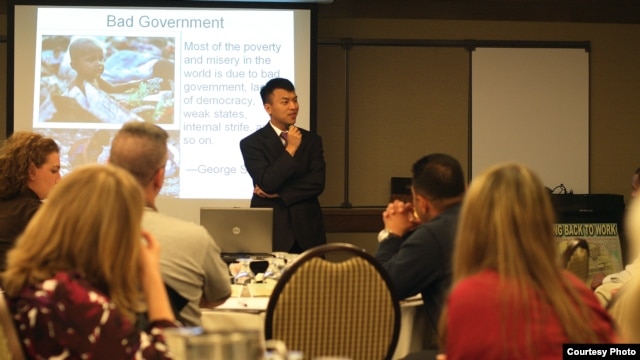23 February 2013
WASHINGTON — Too much foreign aid is used
in Cambodia as a substitute for tax revenue, making it hard for people
to hold their government accountable, a US-based analyst says.
Ear Sophal, author of “Aid Dependence in Cambodia,” told VOA Khmer in a recent interview that when people don’t pay taxes, they don’t own their part of the democratic process.
“No taxation means no representation,” he said. “In a place like Cambodia, because tax revenues are lower than foreign aid, I am wondering: who is answering to whom? Normally in a country, taxes would be collected, people would then say to their government leaders, ‘We pay taxes for services; we expect services.’ And as a result, leaders would have an accountability link between people and their government. Democracy would work.”
This relationship is weakened in Cambodia by foreign aid, he said.
Foreign aid causes a large imbalance between revenue and expenses, because it allows government officials, regardless of financial deficits, to engage in corruption and human rights abuses and to spend far more than national revenues.
“The root cause of the problem, I would say, is corruption, and the enabling factor is foreign aid that enables the continuation of the imbalance between revenues and expenses, because the foreign aid essentially covers that difference and allows the government to spend more than it receives,” he said.
Foreign aid works only when the government has a genuine will to develop their country and turn away from it as soon as possible, he said. He gave the examples of Taiwan and South Korea, whose governments were trying to be self-reliant.
“In both cases, I would say, they did not rely on foreign aid forever,” Ear Sophal said. “They turned away from foreign aid eventually because, after all, foreign aid works only when the country develops, and there are actually relatively few cases of astounding successes like Taiwan and South Korea. For most of the world, perpetual reliance on foreign aid never seems to end.”
There are alternatives, even for governments on the brink of collapse despite foreign intervention and aid dependence, he said. Strong consequences for corruption need to be imposed so that the government is encouraged to tackle that particular problem, he said.
“If you make punishment for corruption harsher and the probability of detecting corruption higher, then you are going to make the cost of corruption higher,” he said.
It is also necessary to recognize the importance of collective action in overcoming problems in different sectors, such as the livestock or rice sectors in Cambodia, he said.
Ear Sophal said another alternative solution is to strengthen civil society, which helps keep the government in check and is a counterweight to corruption.
“Civil society is essentially the only area where you have a chance to call out the government’s malfeasance,” he said. “The role of civil society is still limited and weak in Cambodia.”
Considering the weak rule of law, and ongoing corruption and human rights abuse, lending more money to Cambodia is not a solution, and is in fact “irresponsible,” he said. “Cambodia actually is not at the point where it’s unsustainable in its debt level, but I pity the children who are born today, because they are going to owe far more money than their parents did when they become a working age.”
Even so, Ear Sophal said he is optimistic about Cambodia’s ability to pay back its debt if it focuses on self-reliance, instead of foreign aid, and looks to foreign trade and export. Here, South Korea and Taiwan also have good lessons that Cambodia should learn, he said.
“The garment sector is one area that has been successful in Cambodia, but we need many garment sectors,” he said. “We need far more than the current level of employment offered by the garment sector. These are the types of industry that hopefully can earn the foreign [currency] that will result in the money required essentially to pay back the debt that Cambodia owes.”
Cambodia should not accept more aid for its own sake, he said. It should consider seriously the purpose and origin of that aid. And aid needs to align with Cambodia’s needs. If Cambodia does not accept aid, it can instead use its own resources. Cambodia has the resources, he said, but they are not well allocated and instead fall into corruption.
Ear Sophal, author of “Aid Dependence in Cambodia,” told VOA Khmer in a recent interview that when people don’t pay taxes, they don’t own their part of the democratic process.
“No taxation means no representation,” he said. “In a place like Cambodia, because tax revenues are lower than foreign aid, I am wondering: who is answering to whom? Normally in a country, taxes would be collected, people would then say to their government leaders, ‘We pay taxes for services; we expect services.’ And as a result, leaders would have an accountability link between people and their government. Democracy would work.”
This relationship is weakened in Cambodia by foreign aid, he said.
Foreign aid causes a large imbalance between revenue and expenses, because it allows government officials, regardless of financial deficits, to engage in corruption and human rights abuses and to spend far more than national revenues.
“The root cause of the problem, I would say, is corruption, and the enabling factor is foreign aid that enables the continuation of the imbalance between revenues and expenses, because the foreign aid essentially covers that difference and allows the government to spend more than it receives,” he said.
Foreign aid works only when the government has a genuine will to develop their country and turn away from it as soon as possible, he said. He gave the examples of Taiwan and South Korea, whose governments were trying to be self-reliant.
“In both cases, I would say, they did not rely on foreign aid forever,” Ear Sophal said. “They turned away from foreign aid eventually because, after all, foreign aid works only when the country develops, and there are actually relatively few cases of astounding successes like Taiwan and South Korea. For most of the world, perpetual reliance on foreign aid never seems to end.”
There are alternatives, even for governments on the brink of collapse despite foreign intervention and aid dependence, he said. Strong consequences for corruption need to be imposed so that the government is encouraged to tackle that particular problem, he said.
“If you make punishment for corruption harsher and the probability of detecting corruption higher, then you are going to make the cost of corruption higher,” he said.
It is also necessary to recognize the importance of collective action in overcoming problems in different sectors, such as the livestock or rice sectors in Cambodia, he said.
Ear Sophal said another alternative solution is to strengthen civil society, which helps keep the government in check and is a counterweight to corruption.
“Civil society is essentially the only area where you have a chance to call out the government’s malfeasance,” he said. “The role of civil society is still limited and weak in Cambodia.”
Considering the weak rule of law, and ongoing corruption and human rights abuse, lending more money to Cambodia is not a solution, and is in fact “irresponsible,” he said. “Cambodia actually is not at the point where it’s unsustainable in its debt level, but I pity the children who are born today, because they are going to owe far more money than their parents did when they become a working age.”
Even so, Ear Sophal said he is optimistic about Cambodia’s ability to pay back its debt if it focuses on self-reliance, instead of foreign aid, and looks to foreign trade and export. Here, South Korea and Taiwan also have good lessons that Cambodia should learn, he said.
“The garment sector is one area that has been successful in Cambodia, but we need many garment sectors,” he said. “We need far more than the current level of employment offered by the garment sector. These are the types of industry that hopefully can earn the foreign [currency] that will result in the money required essentially to pay back the debt that Cambodia owes.”
Cambodia should not accept more aid for its own sake, he said. It should consider seriously the purpose and origin of that aid. And aid needs to align with Cambodia’s needs. If Cambodia does not accept aid, it can instead use its own resources. Cambodia has the resources, he said, but they are not well allocated and instead fall into corruption.



2 comments:
Corruption is the illbrid of Hun sen Hanoi dog regime.Cambodia will not get away from Yuon slave unless we are smart enough to be self reliance don't fall into Hanoi's tricks again.Learn from the past history or learn from Sihanuok mistook that trust V.C,the result was V.C stole our land (Koh Tral) and destroyed our country.So cut ties with Yuon politically,only do neutral business.Yuon is the mother of all evils in southeast Asia this century,especially on Cambodia.Wake up Cpp Hun sen!...
Yobal Khmer
Corruption in Cambodia has been systematically ingrained from top to bottom of government officials . Hun Sen who has been PM for 28 years has thought that accept gift & return favor is a normal " culture of sharing " ; there won't be avy harsh punishment for the corrupt CPP affiliated officials , national thieves with impunity .
The international donors should have conscience and should be sorry to their own
citizens who have worked hard to pay taxes which have been wasted by their
government . Foreign aids should be stopped .
Post a Comment